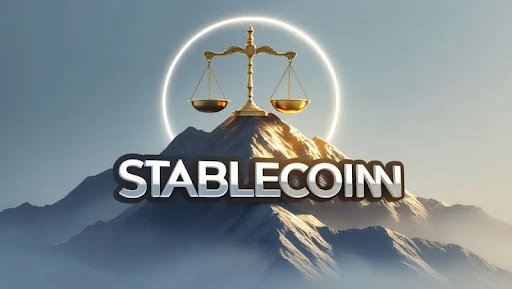Title: U.S. Senate Debates Stablecoin Regulation Amid Democratic Push for Anti-Corruption Provisions
U.S. Senate Debates Stablecoin Regulation Amid Democratic Push for Anti-Corruption Provisions
The U.S. Senate is closer than ever to passing a landmark piece of cryptocurrency legislation—focused on regulating stablecoins—but political tensions continue to escalate as some lawmakers push to include measures aimed at preventing conflicts of interest involving senior government officials, including former President Donald Trump.
This proposed legislation, known informally as the "stablecoin regulation bill," seeks to establish a clear framework for oversight of dollar-pegged digital tokens, a cornerstone of the broader crypto asset ecosystem. The bill, if passed, would set national standards for how stablecoins are issued, backed, and regulated, potentially reshaping the U.S. cryptocurrency market.
While proponents of the bill initially hoped to finalize the legislative process within a single week, it has become clear that the debate will stretch into a second week. One of the main sources of contention stems from a group of Senate Democrats led by Senators Elizabeth Warren and Chris Murphy. They are advocating for an amendment that would prohibit the president, vice president, and other senior government officials from directly or indirectly engaging in stablecoin-related businesses while in office.
This proposed amendment appears to be a direct response to concerns about Trump's alleged involvement with World Liberty Financial, a cryptocurrency venture associated with his family. Critics argue that Trump’s ties to crypto assets pose significant ethical concerns and could undermine the integrity of the office he seeks to reclaim in the 2024 presidential election.
“Elected officials must serve the public interest—not profit from it,” a group of seven Senate Democrats, including Minority Leader Chuck Schumer, said in a public statement. The statement followed an exclusive dinner hosted by Trump that brought together over 200 major investors involved in a memecoin closely linked to his name and image.
The Democrats’ proposed amendment would make it illegal for senior federal officials to benefit from crypto ventures while in office, aiming to close what they describe as a glaring loophole in the current legal and ethical standards. Senator Murphy emphasized that relying on constitutional provisions—such as the Emoluments Clause, which bars presidents from accepting gifts or benefits from foreign entities—is not sufficient due to the legal complexities of enforcement.
“Passing a new, clear law is far easier and more effective than chasing a constitutional case through the courts,” Murphy said during a press conference last Thursday. He warned that some Democrats who supported the initial procedural vote may reconsider their stance if the legislation doesn’t address ethical concerns tied to Trump’s involvement in crypto.
On the other side of the aisle, Republican Senator Bill Hagerty of Tennessee, one of the main sponsors of the bill, expressed optimism about its chances of passing. “We’ve received strong bipartisan support. This is a significant step toward regulating stablecoins responsibly while promoting innovation in the U.S. financial sector,” Hagerty said during an interview.
The legislation, officially titled the Guiding and Establishing National Innovation for U.S. Stablecoins (GENIUS) Act, recently cleared an important 60-vote threshold known as a cloture vote, with support from 66 senators, including over a dozen Democrats. This vote enabled a defined period of floor debate before a final vote, which will only require a simple majority to pass.
Once the Senate approves the bill, the House of Representatives can either adopt the Senate’s version or work on a similar bill, leading to a joint negotiation and potential compromise legislation. This process could further delay the final passage and implementation of stablecoin regulation.
Meanwhile, the push from progressive Democrats to incorporate anti-corruption measures into the bill is gaining momentum, particularly as Trump’s re-election campaign becomes increasingly intertwined with his family's crypto interests. Protesters have taken to the streets in opposition to what they call "presidential profiteering" and have criticized events such as the recent private dinner for memecoin investors hosted by Trump.
Murphy called Trump’s conduct “the most corrupt White House in American history,” and argued that even if these business dealings are visible to the public, their transparency does not negate their ethical implications.
However, Trump’s family and associates have pushed back against these accusations. Eric Trump, the former president’s son and a known crypto enthusiast, addressed the issue earlier this month at a cryptocurrency conference in Toronto. He claimed that the family's involvement in crypto predates his father’s political career and insisted that there is no link between their digital asset ventures and Trump's political influence.
“We were active in the crypto space long before the presidency,” Eric Trump said. “There’s no connection between our business interests and my father’s position.”
Bo Hines, a White House adviser on digital assets, echoed that sentiment during the same event, stating, “The president of the United States can’t be bought.”
Despite these denials, Democratic lawmakers remain skeptical and are pushing for legislative safeguards to prevent even the appearance of impropriety. They argue that the perception of corruption—especially in emerging industries like cryptocurrency—can erode public trust and damage the credibility of the U.S. financial system.
For many lawmakers, the stablecoin regulation bill represents a critical opportunity not only to provide legal clarity for digital asset markets but also to reinforce ethical standards for elected officials. Whether or not the anti-conflict amendment makes it into the final version remains uncertain, but it is clear that the debate over crypto regulation is no longer just about finance and technology—it’s also about transparency, accountability, and the integrity of American democracy.
With another cloture vote looming and final Senate approval on the horizon, all eyes remain on Capitol Hill. The outcome of this legislative battle will not only shape the future of stablecoins in the United States but could also set new precedents for how political leaders engage with the rapidly growing world of digital finance.
As the discussion unfolds, one thing is certain: the intersection of politics, cryptocurrency, and public trust is now front and center in America’s legislative spotlight.

Comments
Post a Comment